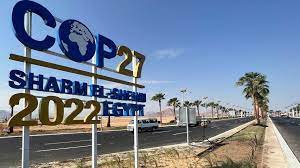Sunday’s curtain-raiser of the climate change conference (COP27) in the Egyptian resort of Sharm El-Sheikh took place against the backdrop of tensions between the world’s major powers US and China over Taiwan, and the economic fallouts from the Russian invasion of Ukraine and the Covid-19 pandemic.
The 27th Conference of the Parties to the United Nations Framework Convention on Climate Change known as the African COP began work trying to breathe new life into the campaign against global warming and its impact.
The conference, which will last until November 18, comprises three main events: the inaugural session, the Country Leaders’ Summit to be held on Monday, before the opening of the high-level segment of the conference, scheduled for November 15.
COP26 President Alok Sharma spoke shortly before the handover ceremony of the conference which was followed by a statement read out by Egyptian Foreign Minister Sameh Shoukry in his capacity as the president of the COP26.
Also speaking at the ceremony were the Executive Secretary of the United Nations Framework Convention on Climate Change, Simon Steele, and the Chairman of the Intergovernmental Panel on Climate Change, Hoesung Lee.
COP27 takes place in a period marked by the impact of nine months of the Russian-invasion of Ukraine, which has send the price of wheat and those of other commodities from that part of the world skyrocketing.
Perhaps the most relevant to COP is the state of tension between the United States and China over Taiwan, a situation which provides a distraction by these two powers from their contributions to the global effort against climate change as the world’s biggest emitters of greenhouse gases.
To the dismay of many climate activists China’s newly reinstalled leader Xi Jingping is not attending COP27.
Since the global coronavirus pandemic, economies have seen gradual recoveries after years of inflation and price hikes.
Against this backdrop, COP policymakers should discuss ways to accelerate the energy transition, increase investment in alternative energies and shift to a green hydrogen economy.
Throughout 11 days of sessions, panel discussions and forums, participants will also explore ways to move from negotiations and planning to the effective implementation of all commitments and promises made at previous COPs.
COP27 is looking to address issues around financing projects covering water, energy, youth, women, agriculture, carbon neutrality, biodiversity and food security.
The discussion of the means of mobilizing action, the examination of the effects of climate change in Africa, creating visions to face these challenges through science and financing are also among the themes of the conference.
According to the UN, negotiations will also focus on technical discussions, in order to determine an operational method for measuring greenhouse gas emissions, so as to guarantee equality for all.
It will be about laying the groundwork for the first global assessment scheduled for COP28, to be held next year in the United Arab Emirates with the aim of taking stock of the collective progress made in the mitigation and adaptation as well as in the implementation of the Paris climate agreement.
HA/APA


